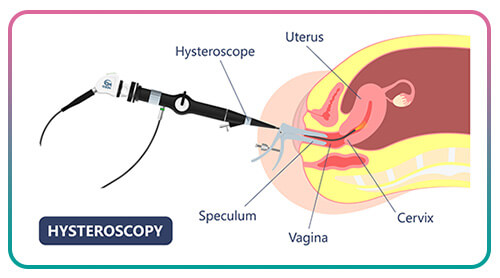In the vast world of fertility treatments, In Vitro Fertilization (IVF) is a widely recognised and successful method for couples facing challenges in conceiving. IVF is an umbrella term that includes a series of procedures offering fertility solutions to expecting couples. The best infertility specialist in Chandigarh can explain the procedures in a more detailed manner. One of the steps during the procedure is called hysteroscopy. As part of the IVF process, hysteroscopy is often recommended to assess and enhance the chances of a successful pregnancy.
There is nothing wrong with having fear before visiting any doctor or clinic. Knowing about the procedure, even the basics, helps in putting that first step towards the path to any speciality clinic or Hysteroscopy Clinic in Chandigarh. So, let’s move forward and debug the concept of hysteroscopy in a more detailed manner.
What is Hysteroscopy in the Context of IVF?
Hysteroscopy is known to be a minimally invasive procedure that helps in examining the inside of the uterus. In the context of IVF, hysteroscopy is performed to evaluate and treat any abnormalities within the uterine cavity that might impact the success of implantation and pregnancy.


Why is Hysteroscopy Recommended Before IVF?
Hysteroscopy is recommended before IVF to identify and address any potential issues within the uterine cavity. Conditions such as uterine polyps, fibroids, adhesions, or abnormalities can affect embryo implantation. Ensuring a healthy uterine environment optimizes the chances of successful IVF outcomes.
Why is hysteroscopy recommended or suggested by the Hysteroscopy Clinic in Chandigarh?
It’s important to note that a hysteroscopy cannot be performed if you are pregnant. A hysteroscopy may be recommended for the following reasons:
- Abnormal Pap test results
- Abnormal uterine bleeding
- Bleeding after menopause
- Diagnosing the cause of infertility or repeated miscarriages
- Examining and removing uterine scarring, polyps, or fibroids
- Locating and removing displaced intrauterine devices (IUDs)
- Placing small birth control inserts into the fallopian tubes
- Removal of a small tissue sample (biopsy)
- Removal of the endometrial lining
How is Hysteroscopy Performed?
Hysteroscopy is usually carried out as an outpatient procedure. The literal procedure includes, “A thin, lighted tube called a hysteroscope is inserted through the cervix into the uterus.” The hysteroscope allows the best infertility specialist in Chandigarh to visualise the uterine lining and detect any abnormalities. If necessary, minor surgical procedures can be performed during hysteroscopy to correct issues that may hinder fertility.
Also read: Best 5 Ways to Boost Fertility in Women with PCOS
Is Hysteroscopy Painful?
Hysteroscopy is generally well-tolerated and considered a low-pain procedure. It is often performed under local anesthesia or mild sedation. Patients may experience mild cramping, similar to menstrual cramps, during or after the procedure. Most individuals can resume normal activities shortly after hysteroscopy. Having a clear mind before the procedure is suggested to avoid any extra discomfort.
How does hysteroscopy stand out in comparison to other procedures?
Hysteroscopy is regarded as the gold standard for assessing uterine health. It has demonstrated superior accuracy in identifying and diagnosing various conditions impacting infertility compared to other methods. While Hysterosalpingogram (HSG) and sonohysterogram, commonly known as saline infusion sonography (SIS), are sometimes viewed as alternatives to hysteroscopy, they are found to be less precise in diagnosing specific conditions.
How Does Hysteroscopy Enhance IVF Success?
Hysteroscopy contributes to IVF success by ensuring an optimal uterine environment. Identifying and treating uterine abnormalities allows for improved implantation of the embryo and a higher likelihood of a successful pregnancy. Addressing these issues before IVF can lead to better outcomes for couples undergoing fertility treatments by IVF specialists in Chandigarh.
Are There Risks Associated with Hysteroscopy?
While hysteroscopy is considered a safe procedure, like any medical intervention, it carries some risks. Potential risks include infection, bleeding, or injury to the uterus. However, these complications are rare, and the benefits of identifying and addressing uterine abnormalities typically outweigh the risks.
When is the Best Time for Hysteroscopy in the IVF Process?
Hysteroscopy is often scheduled during the initial stages of the IVF process after a thorough evaluation of both partners. By addressing uterine concerns early in the journey, couples can proceed with IVF with a greater understanding of potential solutions for any uterine factors that may affect success.
Wrapping Up:
As per the Hysteroscopy Clinic in Chandigarh, utilizing hysteroscopy-guided biopsy is an efficient method for diagnosing chronic infections that impact female fertility. Chronic infections are estimated to be prevalent in around 15% of individuals undergoing IVF. Hence, it is an effective solution for IVF patients. Hysteroscopy plays a crucial role in the IVF journey by ensuring that the uterine environment is optimal for embryo implantation.
By addressing any potential issues within the uterus, the chances of a successful pregnancy are increased by many folds, especially for couples going through IVF. If you are considering IVF or have questions about hysteroscopy, consult with your IVF specialist in Chandigarhor anywhere in the world to determine the most appropriate course of action tailored to your individual needs and circumstances.


